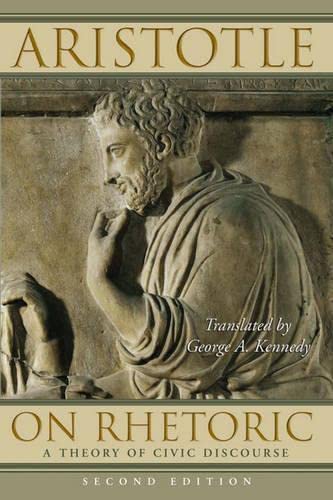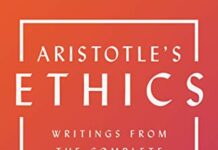
Ebook Info
- Published: 2006
- Number of pages: 352 pages
- Format: PDF
- File Size: 2.47 MB
- Authors: Aristotle
Description
This new edition of George A. Kennedy’s highly acclaimed translation and commentary offers the most faithful English version ever published of On Rhetoric. Based on careful study of the Greek text and informed by the best modern scholarship, the second edition has been fully revised and updated. As in the first edition, Kennedy makes the work readily accessible to modern students by providing an insightful general introduction, helpful section introductions, a detailed outline, extensive explanatory notes, and a glossary of Aristotle’s rhetorical terms. Striving to convey a sense of Aristotle’s distinctive way of thinking, Kennedy preserves the meaning and technical language of the original text, explaining it in detail as opposed to simplifying it as other translations do.Updated and expanded in light of recent scholarship, the second edition features:* A revised introduction with two new sections: “The Strengths and Limitations of On Rhetoric” and “Aristotle’s Original Audience and His Audience Today”* A more user-friendly format: running heads now include book and chapter numbers* An updated bibliography* Revised appendices that provide translations of new supplementary texts–Socrates’ Critique of Sophistic Rhetoric; Lysias’ Speech Against the Grain Dealers; two selections from Isocrates (from Against the Sophists and from the Antidosis); selections from Rhetoric for Alexander; and Demosthenes’ Third Philippic–and an extensive revision of George A. Kennedy’s essay “The Earliest Rhetorical Handbooks”
User’s Reviews
Editorial Reviews: Review Praise for the previous edition:”[This book] is much more than a translation; it is a guide to the literature, a mini-commentary, and a do-it-yourself manual to understanding Aristotle. . . . [It] deserves to be the standard translation for decades to come.”–Quarterly Journal of Speech”George Kennedy has taken on a difficult job–providing a scholarly edition of the Rhetoric that will also serve as a textbook for students–and has succeeded admirably. His introduction gives an excellent overview of Aristotle’s work and is a pleasure to read. The chapter-by-chapter outline is magnificent.”–Erika Lindemann, University of North Carolina at Chapel Hill”Easy-to-read, trustworthy, and has the added distinction of bringing out more clearly than any other translation the way Aristotle’s reasoning works. It will improve the general state of Aristotle studies in the English-speaking world.”–Thomas Conley, University of Illinois”Kennedy’s extensive use of footnotes and careful editing allow students access to Aristotle’s writings as few other translations are able to do. This book is a must for any contemporary study of classical rhetorical theory.”–James J. Tarbox, Oregon State University About the Author George A. Kennedy is at University of North Carolina at Chapel Hill (Emeritus).
Reviews from Amazon users which were colected at the time this book was published on the website:
⭐SECOND EDITION ARISTOTLE’S ON RHETORIC TRANSLATED BY GEORGE A. KENNEDYIf this is the `scholarly edition’ that is `the most faithful English version ever published’ and `informed by the best modern scholarship’, it is vastly disappointing has not only self-censured from the first edition references to Martin Heidegger on pages ix and 124, note 7, as well as the index, but totally ignored the publication of GA 18 Grundbegriff der aristotelischen Philosophie by V. Klostermann in 2002 and translated by Metchalf and Tanzer as BASIC CONCEPTS OF ARISTOTELIAN PHILOSOPHY, Indiana university Press, 2009, which deals extensively in detail with Aristotle’s RHETORIC starting at page 78 and going to page 176 in the main. In the first edition, Kennedy uses Heidegger to raise the philosophical importance of the RHETORIC. In the second edition he is doing something else, maybe hiding with his tail between his legs because someone accused him of being a Nazi lover. The political aspect of the RHETORIC, though, is overwhelming in its importance, and Aristotle’s own declaration that it can be used for good or evil is evaded and downgraded by Kennedy. Heidegger’s fundamental insight relevant here, which is truly fearful in its perception, is that all philosophy, all human knowing, is some kind of political process of trying to persuade someone else of what is the truth of the case of the facts of the matter. Even talking about a rock, then, since you are talking to someone else, has thereby a political aspect since you are trying to make a change in the social structure of knowledge.***Kennedy’s censorship therefore SUPPORTS Heidegger’s illustration from Jacob Burckhardt with his statement from PARMENIDES, `Here lies concealed the primordial ground of that feature Jacob Burckhardt presented for the first time in its full bearing and manifoldness: the frightfulness, the horribleness, the atrociousness of the Greek ðüëéò. Such is the rise and fall of man in his historical abode of essence – apolis -far exceeding abodes, homeless, as Sophocles calls man [Antigone]. it is not by chance man is spoken of in this way in Greek tragedy. For the possibility and necessity of “tragedy” itself has its single source in the conflictual essence of aletheia. There is only GREEK tragedy and no other besides it. Only the essence of Being as experienced by the Greeks has this primordial character that `the tragic’ becomes a necessity here. In the introduction of his lectures on the history of Greek culture, Jacob Burckhardt knowingly inserts a thesis he heard as a student from his teacher in classical philology at Berlin, Bockh, and it runs as follows: “the Hellenes were more unhappy than most people think.” Burckhardt’s presentation of the Greeks . . . was constituted entirely on this insight . . .’, page 90, translated by Schuwer and Rojcewicz, Indiana University Press, 1992[Vittorio Klostermann 1982, GA 54].***Anyone familiar with the savagery of the unrepublican, essentially unconstitutional in our modern sense, legally unfettered Athenian democracy in Thucydides’ History of the Peloponnesian War that the American founding fathers and English parliamentarians hated so much should be depressed by Kennedy’s evasion of Heidegger’s challenge to Kennedy’s bright and pretty picture of things as they are EVEN AS NOW our own political figures are describing modern American politics as self-cannibalism [Senator Arlen Specter, see ‘In final Senate speech, Specter slams political `cannibalism’].
⭐I received the George Kennedy translation when I ordered the book. I bought this book for a college rhetoric class, and it’s one of the few textbooks I’ve kept! If you’ve ever read Aristotle, you know that he can be a tedious read. What’s more, is that this text was essentially his “lecture notes,” so it’s not exactly cleaned-up. Fortunately for us students, Kennedy’s summaries preceding each chapter and the footnotes following each page proved absolutely invaluable. He highlighted key concepts, revealed ambiguities (e.g. the enthymeme from a syllogism), and did all that in a more familiar, vernacular language where possible. If you’re reading Aristotle, get this book!
⭐I actually really liked this book, and I read even further than I was supposed to for class, haha.Very interesting read, and I learned much more than I thought I would.
⭐Quality product
⭐”Rhetoric may be defined as the faculty of observing in any given case the available means of persuasion” (pg. 4).Logic, human character & emotions deep understanding are the key ingredients of Aristotle’s receipt and, despite it was written quite some time ago, it will never be out-of-date for all of us who are involved into human interactions.
⭐Ok, for what it is, it’s alright but there’s a redundancy throughout the text that makes me think those studying, researching and writing books on Rhetoric mostly hate it as much as I hate the topic myself. Theories in the book pretty much are recycled and repeated from chapter to chapter. I had to buy it for a class….
⭐Great book, best translation there is
⭐A difficult read at first but once I was able to figure out how to interpret the author, I became intrigue by the concept of rhetoric.
Keywords
Free Download On Rhetoric: A Theory of Civic Discourse, 2nd Edition 2nd Edition in PDF format
On Rhetoric: A Theory of Civic Discourse, 2nd Edition 2nd Edition PDF Free Download
Download On Rhetoric: A Theory of Civic Discourse, 2nd Edition 2nd Edition 2006 PDF Free
On Rhetoric: A Theory of Civic Discourse, 2nd Edition 2nd Edition 2006 PDF Free Download
Download On Rhetoric: A Theory of Civic Discourse, 2nd Edition 2nd Edition PDF
Free Download Ebook On Rhetoric: A Theory of Civic Discourse, 2nd Edition 2nd Edition




